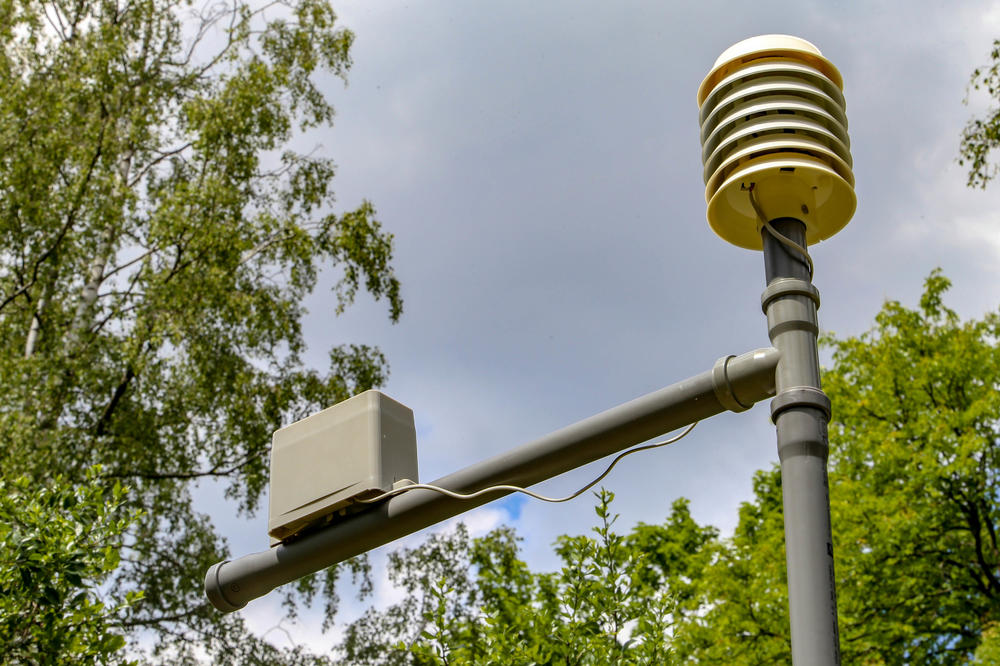Training a New Generation of Meteorologists and Forecasters
Predicting the weather with certainty is trickier than it seems – A research team is working on projects to educate the general public.
Nov 11, 2020
A measuring device consisting of a passively ventilated device with sensors for detecting temperature, humidity, pressure, radiation, and solar cells as well as a rechargeable battery (at right) and rain gauge (at left).
Image Credit: Cristopher Böttcher
When the weather forecast reports there will be a massive thunderstorm, does that mean it will definitely happen? Why do meteorologists sometimes seem uncertain? “We want to find a better method of communicating knowledge of how weather forecasts and warnings work – preferably in a way that’s fun,” says Henning Rust, a professor of statistical meteorology at Freie Universität.
Inspiration struck when Germany’s national meteorological service (Deutscher Wetterdienst, DWD) launched a nationwide measurement campaign. This time, researchers didn’t just want to find a better way of presenting weather warnings to explain them to laypeople, they also wanted to foster a more well-rounded understanding of the difficulties that lie in forecasting the weather – beginning with how it’s measured. “That’s why we decided to build weather stations using small micro-controllers for collecting atmospheric data. The data is radio transmitted to a receiver and can be immediately visualized on a smartphone,” explains Rust.
That was how two citizen science projects got started for school students in grade five and up. The projects are being organized by the DWD’s Hans Ertel Center for Weather Research and are part of the WEXICOM research project, which looks at weather warnings and how information on extreme events is communicated and what actions are taken as a result.
While classes from the Oder-Spree district in Brandenburg will only be able to participate starting sometime next year due to Covid-19, the pilot project KARE-CS, which studies climate change adaptation at the regional level, has already been launched in the Alpine Foreland of Bavaria – a region especially affected by heavy rainfall. The interdisciplinary project organized by Freie Universität Berlin and LMU Munich involves a collaboration with the civic foundation Energiewende Oberland based in Penzberg, southern Bavaria, with funding from the German Federal Ministry of Education and Research.
A Sociological Study Is Investigating the Project’s Learning Outcomes
“We sent participants a construction kit for building miniature weather stations. They put these together themselves and measured the temperature, air pressure, and solar radiation values over the summer vacation,” Professor Henning Rust explains. The “MESSI” weather station consists of a micro-controller, solar cells, a housing unit made by a 3D printer, and sensors. A clear overview of these data is presented on an app the researchers developed. By using online materials as well as instructional and music videos – not to mention watching video conferences with meteorologists – the young forecasters learn the basics of how to predict the weather.
A sociological study is investigating the success of the project’s learning outcomes. They are also examining the extent to which measurements taken by laypeople could help to verify weather forecasts and how they could supplement established networks among professionals. “What does 70 percent humidity or 3 millimeters of precipitation mean? We hope that school students develop a sense for the weather, not just by looking at measurements, but by standing outside and simply taking note of what the weather is doing,” explains Rust.
This text originally appeared in German on October 4, 2020, in the Tagesspiegel newspaper supplement published by Freie Universität.
Further Information
Prof. Dr. Henning Rust, Freie Universität Berlin, Department of Earth Sciences, Institute of Meteorology, Email: henning.rust@fu-berlin.de

